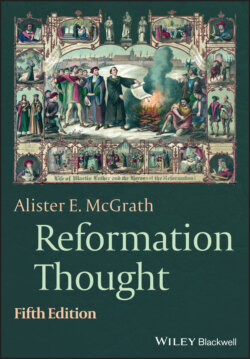Читать книгу Reformation Thought - Alister E. McGrath - Страница 29
Religious Democratization: The Use of the Vernacular
ОглавлениеOne of the lessons that Martin Luther learned from Erasmus of Rotterdam was the importance of the printing press in projecting his intellectual influence within society. In 1520, Luther began to advance the cause and extend the reach of his program of reformation by appealing directly to the German people through the medium of print, over the heads of clerics and academics. Many of Luther’s early reforming works during the 1520s were short pamphlets written in the German language, aimed directly at an intelligent lay readership. It was a tactic that would be imitated throughout Europe, as the power of the vernacular pamphlet became obvious to all. Luther realized that using the vernacular as a means of theological communication was essential if he was to secure popular support for his reforms.
Why was this development so important? The language of the academy, the church, and the state in western Europe throughout the Middle Ages was Latin. There was an obvious need for a common language to allow communication across this vast and diverse region of the world. Latin was the language of the great Roman poets, rhetoricians, politicians, and philosophers, and of highly influential Christian theologians such as Augustine of Hippo, Ambrose of Milan, and Tertullian. Luther knew that anything he wrote in Latin would be understood by the educated elite across Europe.
Yet Luther wanted to reach beyond an academic readership, and touch the hearts and minds of ordinary people. The decision to publish in German was iconic, making a statement about the inclusive nature of the reformation that Luther proposed to pursue. To publish in Latin was to exclude the ordinary people. To publish in his native German was to democratize the debate about the future of the church, by including those who were traditionally marginalized by the use of the ancient scholarly language. From that moment onward, one of the hallmarks of Protestantism would be its use of the vernacular at every level. The Latin liturgy of church services would be replaced with vernacular alternatives. Most importantly of all, the Bible would also be translated into the language of the people.
An example will help illustrate the importance of both printing and the use of the vernacular to the propagation of the ideas of the Reformation. A crucial turning point in the French Reformation was marked by the publication of the French-language edition of Calvin’s Institutes of the Christian Religion in 1541. The work had originally been published in Latin in 1536. Calvin, who was French, realized the importance of explaining his ideas in everyday language. Suddenly, coherently expressed and carefully justified radical reforming doctrines were available within France in a language which most could understand (see pp. 274–6).
This development caused near panic in Paris. On July 1, 1542, the Parisian authorities directed that all works containing heterodox doctrines, especially Calvin’s Institutes, were to be surrendered to the authorities within three days. Calvin’s Institutes were seen as the spearhead of a Genevan assault upon the French Catholic church, mediated through the printed word in French. The reaction from the booksellers of Paris was immediate: they protested that they would face financial ruin if they were prohibited from selling such books. There was a popular demand for works which were considered to be dangerously unsound by the authorities – further evidence of the importance of a literate and affluent laity in promoting the ideas of the Reformation. Indeed, the bookseller Laurent de Normandie, a friend of Calvin, found the contraband book trade so profitable that he emigrated to Geneva, in order that he could publish such books rather than just sell them.
This naturally leads us to consider the importance of the new cultural environment which arose through the use of movable type in printing, widely regarded as transforming western European culture.
